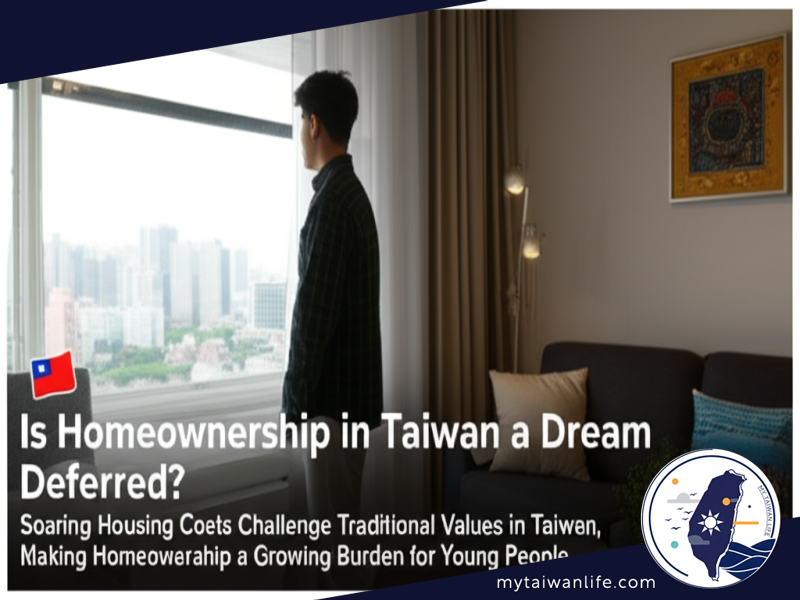Is Homeownership in Taiwan a Dream Deferred? Young Taiwanese Rethink the Value of Property
Soaring Housing Costs Challenge Traditional Values in Taiwan, Making Homeownership a Growing Burden for Young People

TAIPEI (Taiwan News) — Young people in Taiwan are increasingly questioning the traditional value of homeownership, a societal norm often associated with wealth and security, amidst skyrocketing housing prices.
A recent report by The Economist highlighted the challenging burden of homeownership for young Taiwanese. The report noted that the average house price in Taiwan is a staggering 11 times the average annual income.
According to the UN, housing is considered affordable when the house-price-to-annual household income ratio is 3 or less and the rent-to-monthly household income ratio (RIR) is 25% or less. These metrics highlight significant affordability issues.
The situation is particularly acute in Taipei, where average housing prices are a daunting 16 times the average income. This places Taipei above major global cities like New York at 9.8, London at 14, and Seoul at 13.
Even in Keelung, the city in Taiwan with the lowest housing price-to-income ratio, the figure stands at 6.5, still significantly exceeding the UN's affordability benchmark.
The report further revealed that the average household in Taiwan spent almost 50% of its disposable income on mortgage payments last year. In Taipei, this figure climbed to over 70%.
A citizen quoted in the report observed that Taiwan's government has historically promoted homeownership, reflecting traditional Chinese beliefs linking land with wealth and security. Notably, approximately 85% of Taiwanese households live in homes they own.
Housing prices in Taipei have dramatically increased since 2000. This leaves young people facing a very different financial landscape compared to previous generations who benefited from early home investments.
The report also highlighted a significant surplus of housing units compared to households, according to an urban planning advocate. The latest census data indicates that one-fifth of homes in Taiwan are vacant, and almost a quarter of new properties built in the last five years remain unoccupied.
A key issue highlighted by the report is the hoarding of unused properties by wealthy buyers, who often pay minimal taxes. The government's reluctance to implement significant tax policy changes further exacerbates this situation.
Other Versions
¿Es la propiedad de la vivienda en Taiwán un sueño aplazado? Los jóvenes taiwaneses se replantean el valor de la propiedad
L'accession à la propriété à Taïwan est-elle un rêve différé ? Les jeunes Taïwanais repensent la valeur de la propriété
Apakah Kepemilikan Rumah di Taiwan Hanya Mimpi yang Tertunda? Kaum Muda Taiwan Memikirkan Kembali Nilai Properti
La proprietà della casa a Taiwan è un sogno rimandato? I giovani taiwanesi ripensano il valore della proprietà
台湾の持ち家は夢の先送り?台湾の若者が不動産の価値を再考する
대만에서 내 집 마련은 꿈일까요? 부동산의 가치를 다시 생각하는 대만 젊은이들
Pangarap na Naantala ba ang Pagmamay-ari ng Bahay sa Taiwan? Muling Iniisip ng mga Kabataang Taiwanese ang Halaga ng Ari-arian
Является ли домовладение на Тайване отложенной мечтой? Молодые тайваньцы переосмысливают ценность недвижимости
การเป็นเจ้าของบ้านในไต้หวันเป็นเพียงความฝันที่ถูกเลื่อนออกไปหรือไม่? ชาวไต้หวันรุ่นใหม�
Sở hữu nhà ở ở Đài Loan có phải là một giấc mơ bị trì hoãn? Thanh niên Đài Loan suy nghĩ lại về giá trị của bất động sản
Categories
Warning: Undefined array key "article_category" in /web/htdocs/www.mytaiwanlife.com/home/news/sidebar.php on line 126
Deprecated: html_entity_decode(): Passing null to parameter #1 ($string) of type string is deprecated in /web/htdocs/www.mytaiwanlife.com/home/news/sidebar.php on line 126
Warning: Undefined array key "article_category" in /web/htdocs/www.mytaiwanlife.com/home/news/sidebar.php on line 126
Deprecated: html_entity_decode(): Passing null to parameter #1 ($string) of type string is deprecated in /web/htdocs/www.mytaiwanlife.com/home/news/sidebar.php on line 126
Warning: Undefined array key "article_category" in /web/htdocs/www.mytaiwanlife.com/home/news/sidebar.php on line 126
Deprecated: html_entity_decode(): Passing null to parameter #1 ($string) of type string is deprecated in /web/htdocs/www.mytaiwanlife.com/home/news/sidebar.php on line 126
Warning: Undefined array key "article_category" in /web/htdocs/www.mytaiwanlife.com/home/news/sidebar.php on line 126
Deprecated: html_entity_decode(): Passing null to parameter #1 ($string) of type string is deprecated in /web/htdocs/www.mytaiwanlife.com/home/news/sidebar.php on line 126
Warning: Undefined array key "article_category" in /web/htdocs/www.mytaiwanlife.com/home/news/sidebar.php on line 126
Deprecated: html_entity_decode(): Passing null to parameter #1 ($string) of type string is deprecated in /web/htdocs/www.mytaiwanlife.com/home/news/sidebar.php on line 126
Warning: Undefined array key "article_category" in /web/htdocs/www.mytaiwanlife.com/home/news/sidebar.php on line 126
Deprecated: html_entity_decode(): Passing null to parameter #1 ($string) of type string is deprecated in /web/htdocs/www.mytaiwanlife.com/home/news/sidebar.php on line 126

